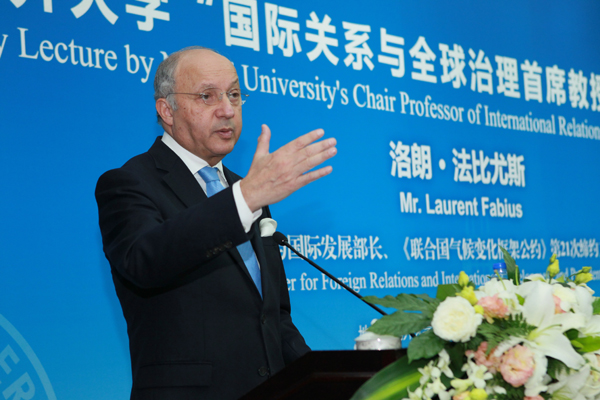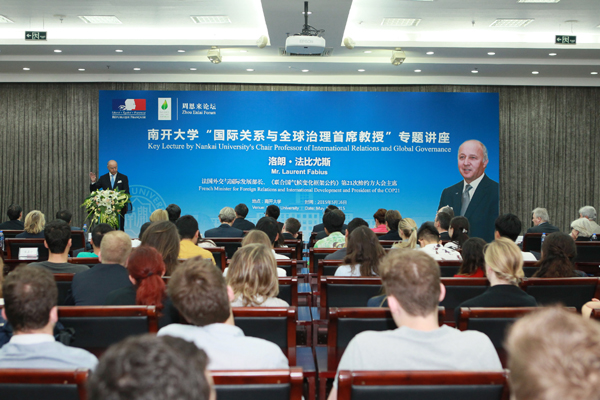 |
|
Laurent Fabius, Foreign Minister of France speaks on climate change at Nankai University in Tianjin on May 16. [Photo provided to China Daily] |
 |
|
Students and faculty attend the speech on climate change by Laurent Fabius, Foreign Minister of France on May 16. [Photo provided to China Daily] |
"We have to seek cooperation in dealing with global climate change. There are no other options. We have only one earth," remarked Laurent Fabius, Foreign Minister of France. He expressed his concerns on global warming and called for cooperation in global climate change during his speech at the Nankai University in Tianjin on May 16.
"Human beings are facing threats from global warming, increasing sea levels, and extreme weather. These facts are becoming more and more frequent and serious, while all these problems are due to the emission of large amount of green house gases from daily life and transportation," said Fabius.
This was the fourth time Fabius visited Nankai University. As the university's chief professor of international relations and global management, Fabius was invited to give a public speech and was welcomed by a full house of students and faculty members.
The 21st United Nations (UN) Climate Change Conference will be held in Paris in the end of this year. The conference will be decisive in reaching consensus on global implementations in reducing greenhouse effects. The negotiations on climate change will see a rapid development in reaching goals and enacting rules.
Promoting cooperation on global climate change is one of the major reasons for Fabius's visit in China and his speeches.
"Global warming is not only an environmental problem, it also brings economic, social, and political problems. Social safety has also been challenged, as the fight for resources such as water and food can upgrade to large scale immigration and wars," said Fabius.
In order to guarantee proper lives in the future, people have to take actions, such as using renewable or low-carbon energy, developing environmentally friendly agriculture, and finding transportation patterns that exert less influence to the ecosystem, Fabius said.
The world has launched many measures to deal with climate change. The UN established the Intergovernmental Panel on Climate Change (IPCC) in 1988. The organization has provided accurate and complete evaluation and statistics on climate change since 1990s.
As the biggest producer and consumer of renewable products, China plays a major role in the industry. Many cities in China, such as Wuhan, have developed relationships with cities in France in green energy. Many countries around the world are making efforts to reduce carbon emissions, said Fabius.
"Admittedly, all the efforts together present a positive atmosphere – the world achieved better emission reduction results last year compared with previous years. But global measures are needed, such as a global cooperation system," said Fabius. Therefore, he said, this year's UN Climate Change Conference in Paris is of great necessity.
The world is expected to meet four consensuses during the conference, said Fabius.
According to Fabius, the most important consensus would be a global agreement supported by 195 participating countries. Such an agreement has never been reached before.
The world should limit global warming and achieve the goal of reducing global average temperature by 1.5 to two degrees centigrade. Otherwise, IPCC predicts that global temperaturse will increase four to five degrees cetigrade. In some countries, the temperature will rise eight degrees cetigrade, which will bring disastrous results, according to Fabius.
The agreement should be global, fair, and long-term. Every country should take responsibility according to its unique situation. Countries should reach agreement on problems before the conference in order to achieve better results, said Fabius.
In addition, each country should be accountable to the global emission reduction. The countries of the European Union (EU) have decided to reduce emissions by 40 percent by 2030. China and the US are the largest carbon sources, and produced individual goals for emission reduction last November, according to Fabius.
These efforts are beneficial to the process of the conference. Other countries should also take action, said Fabius.
A financial plan should be enacted. Undeveloped countries need financial support in emission reduction. Some small countries are facing the threat of rising sea levels. And some other countries have extremely low carbon emissions and poor economic situations, while also suffering from climate change.
Therefore, Fabius called upon the public and individuals to provide annual financial support of a billion dollars to developing countries by 2020. More investments are expected in environmental protection. These need support from global financial institutions.
In fact, financial institutions play an extremely important role in environmental protection. France is participating in the newly established Asian Infrastructure Investment Bank (AIIB). The institution is able to provide capital to renewable energy projects and contribute to the reduction of greenhouse gases.
The whole society should make efforts, according to Fabius. Private enterprises and regional entities should participate in the war against climate change.
Fabius has talked with many leading entrepreneurs in China. Jack Ma, CEO of Alibaba expressed his will to contribute to the climate change conference this year. Fabius hoped more enterprises, local governments, and individuals would stand out to support the conference.
Fabius is positive about the conference, as he has seen many satisfactory effects. The atmosphere of scientific research has been changed. Technology has been greatly improved. Green technology becomes more economic and convenient. Private businesses are becoming more active in green development, as they have realized high profits from green development.
"It is worth mentioning that the joint statement on climate change by China and the US last November shows the two largest emission sources' willingness to change. This effort serves to drive other countries," said Fabius.
Ad the end of the speech, Fabius said confidently, "Last year is the 50th anniversary of diplomatic relations between China and France. In the past five decades, China and France led global relations. I believe China and France will join hands again in the climate change conference. The conference has to be successful."
Fabius first visited Nankai University in 2009 and was appointed as an honorary professor. Fabius visited the university for the second time in 2011, seeking cooperation between Nankai University and Rouen Business School, and gave a speech on global cooperation and mutual development. Fabius was appointed as chief professor of international relations and global management on his third visit in 2014 and gave a speech on global management in the 21st century.
Fabius was born in Paris in 1946 and graduated from Ecole Normale Superieure and Ecole Nationale d'Administration, which are homes for national senior officials.
He was the Minister of the Budget from 1981 to 1983, the Minister of Industry and Research from 1983 to 1984, the Prime Minister of France from 1984 to 1986, and President of the National Assembly and Minister of Finance from 2000 to 2002. He has been Minister of Foreign Affairs and International Development since 2012.

 Daily life
Daily life




